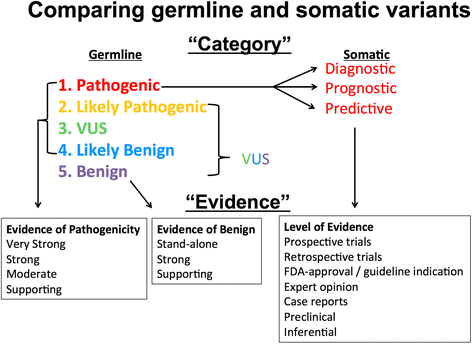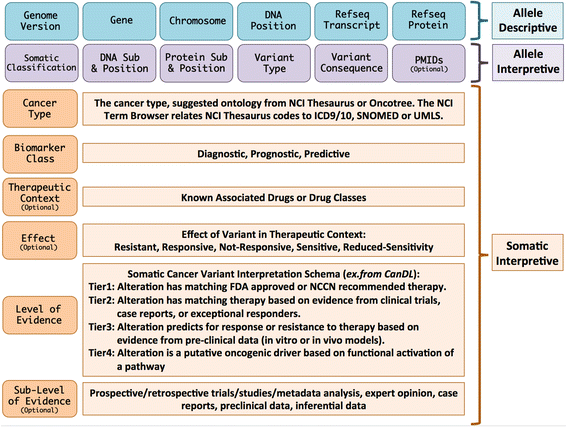Somatic cancer variant curation and harmonization through consensus minimum variant level data
- PMID: 27814769
- PMCID: PMC5095986
- DOI: 10.1186/s13073-016-0367-z
Somatic cancer variant curation and harmonization through consensus minimum variant level data
Abstract
Background: To truly achieve personalized medicine in oncology, it is critical to catalog and curate cancer sequence variants for their clinical relevance. The Somatic Working Group (WG) of the Clinical Genome Resource (ClinGen), in cooperation with ClinVar and multiple cancer variant curation stakeholders, has developed a consensus set of minimal variant level data (MVLD). MVLD is a framework of standardized data elements to curate cancer variants for clinical utility. With implementation of MVLD standards, and in a working partnership with ClinVar, we aim to streamline the somatic variant curation efforts in the community and reduce redundancy and time burden for the interpretation of cancer variants in clinical practice.
Methods: We developed MVLD through a consensus approach by i) reviewing clinical actionability interpretations from institutions participating in the WG, ii) conducting extensive literature search of clinical somatic interpretation schemas, and iii) survey of cancer variant web portals. A forthcoming guideline on cancer variant interpretation, from the Association of Molecular Pathology (AMP), can be incorporated into MVLD.
Results: Along with harmonizing standardized terminology for allele interpretive and descriptive fields that are collected by many databases, the MVLD includes unique fields for cancer variants such as Biomarker Class, Therapeutic Context and Effect. In addition, MVLD includes recommendations for controlled semantics and ontologies. The Somatic WG is collaborating with ClinVar to evaluate MVLD use for somatic variant submissions. ClinVar is an open and centralized repository where sequencing laboratories can report summary-level variant data with clinical significance, and ClinVar accepts cancer variant data.
Conclusions: We expect the use of the MVLD to streamline clinical interpretation of cancer variants, enhance interoperability among multiple redundant curation efforts, and increase submission of somatic variants to ClinVar, all of which will enhance translation to clinical oncology practice.
Keywords: Cancer genomics; Data standard; Somatic variant curation; Somatic variant interpretation.
Figures



References
-
- Rose S. Huge data-sharing project launched. Cancer Discov. 2016;6(1):4–5. - PubMed
-
- Landrum MJ, Lee JM, Benson M, Brown G, Chao C, Chitipiralla S, Gu B, Hart J, Hoffman D, Hoover J, Jang W, Katz K, Ovetsky M, Riley G, Sethi A, Tully R, Villamarin-Salomon R, Rubinstein W, Maglott DR. ClinVar: public archive of interpretations of clinically relevant variants. Nucleic Acids Res. 2016;44(D1):D862–8. doi: 10.1093/nar/gkv1222. - DOI - PMC - PubMed
Publication types
MeSH terms
Grants and funding
LinkOut - more resources
Full Text Sources
Other Literature Sources

